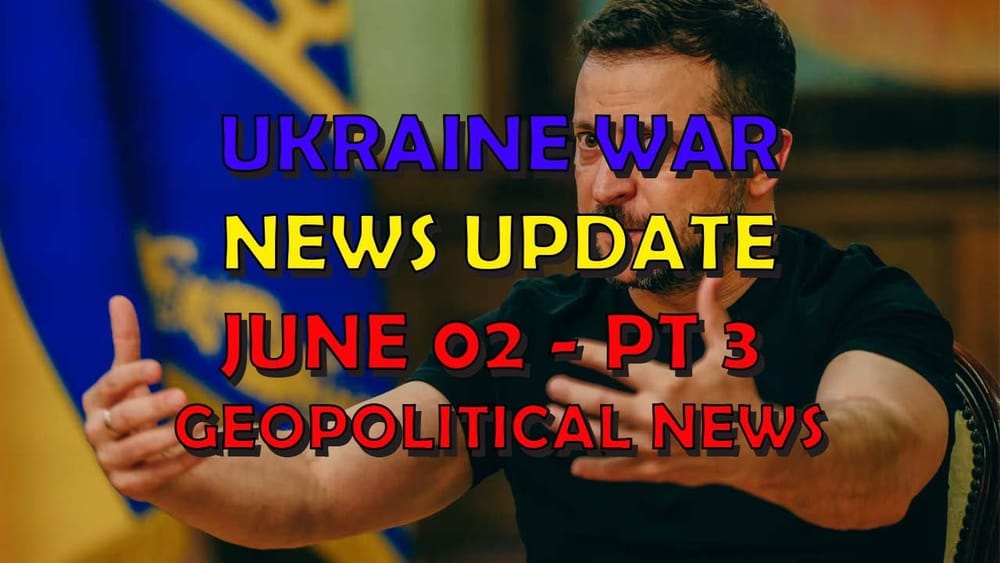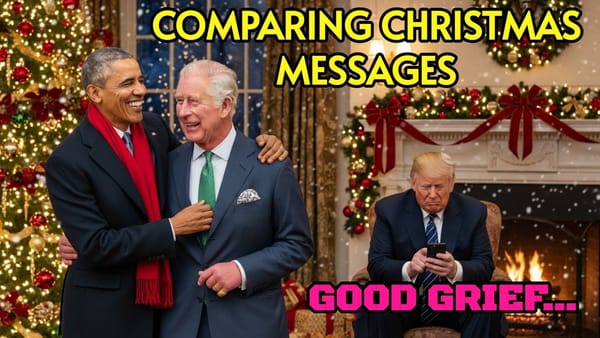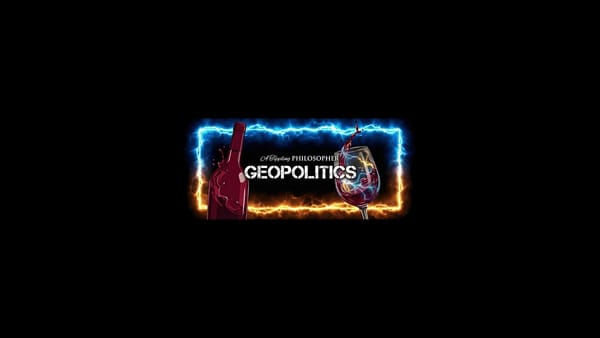Ukraine War Update NEWS: Geopolitics News
Table of Contents 📖
"If the US wants to isolate itself and regress from international integration and influence projects… they will not be able to do the kind of trade deals that are used to doing, things will, there will be gaps, there will be vacuums left where the the US retreats that will be filled by almost certainly authoritarian regimes. China will fill in the gaps."
Hello Team
🎦 00:00-00:11⏩
Jonathan welcomes viewers to another ATP Geopolitics video, a Ukraine War news update focussing on geopolitics on the 2nd of June 2024.
Return to top⤴️
Zelensky in Singapore: Meeting World Leaders and Condemning Russia
🎦 00:11-03:09⏩
- Ukrainian President Zelensky is in Singapore for a security conference, meeting with leaders like US Secretary of Defense Lloyd Austin.
- Zelensky criticizes Russia, accusing them of disrupting the upcoming peace summit in Switzerland and China for supporting the war.
- He also highlights Saudi Arabia's withdrawal from the peace summit, suggesting pressure from China.
- Jonathan observes Zelensky's increasingly direct approach, believing he's abandoning niceties out of urgency for support.
- Jonathan acknowledges the risk of Zelensky's directness but understands his frustration after two and a half years of war.
US-China Relations: Pentagon Downplays War Fears, China Responds With Accusations
🎦 03:09-04:16⏩
- US Secretary of Defense Lloyd Austin states that war with China is avoidable, emphasizing the need for dialogue to prevent misunderstandings.
- Jonathan finds Austin's need to make such a statement suggests heightened tensions and a precarious geopolitical situation.
- In response, Chinese Lieutenant General Jing Zhangfeng accuses the US of creating a NATO-like alliance in the Asia-Pacific, calling them the biggest threat to regional stability.
- Jonathan sees this exchange as another sign that the world is already in World War III, referencing the overt war in Ukraine and simmering tensions elsewhere, like Taiwan.
US Approves Use of Weapons for Strikes Inside Russia
🎦 04:16-06:36⏩
- The White House reveals it acted swiftly to permit Kyiv to use US weaponry for limited strikes inside Russia, citing the need to protect Kharkiv from being overrun.
- Jonathan notes differing views on the speed of the decision, with some arguing it should have been the default stance.
- He suggests the quick approval might reflect a pre-existing US military strategy regarding cross-border weapon use.
- Jonathan presents two perspectives:
- A "charitable" view that acknowledges the decision's seriousness and relatively fast approval.
- A more critical view that believes permission should have been granted much earlier without debate.
Zelensky Calls for Lifting Restrictions on ATACMs
🎦 06:36-07:32⏩
- Zelensky calls for the removal of restrictions on using ATACMs, long-range tactical missiles.
- Jonathan mentions discussing this on a recent live stream and a viewer questioning the evidence of such restrictions.
- Despite the lack of official statements, Jonathan points out the widespread reporting on these restrictions.
- Zelensky's request confirms the existence of these limitations, as Russia possesses similar weapons that Ukraine cannot target with Western weaponry.
Russia Actively Opposing Swiss Peace Summit, Zelensky Seeks Global Support
🎦 07:32-09:49⏩
- Anton Gerashchenko, advisor to the Minister of Internal Affairs of Ukraine, highlights Russia's efforts to undermine the Swiss peace summit.
- Jonathan acknowledges uncertainty about the summit's date due to potential overlap with the G7 meeting.
- He emphasizes the significance of diplomatic participation as a demonstration of support for Ukraine.
- Zelensky's call for global leaders, including US President Biden, to attend the summit highlights its importance for Ukraine's position.
- Jonathan observes pressure from Ukrainians for Biden's presence while suggesting US Secretary of State Blinken might be more effective in discussions.
- He believes Biden's presence would primarily serve as a symbolic gesture of US support.
Zelensky's Upcoming Visit to the Philippines: Seeking Support in the Indo-Pacific
🎦 09:49-11:11⏩
- After Singapore, Zelensky will travel to the Philippines, his first visit since being elected in 2019.
- Jonathan underlines the Philippines' strategic significance in the Indo-Pacific, particularly its alignment with the US against China.
- He notes the Philippines' history of hosting US military bases and its vulnerability to Chinese aggression, citing recent attacks on Filipino boats by the Chinese Coast Guard.
- Jonathan concludes that Zelensky's visit aims to secure the Philippines' support in the context of rising tensions with China.
Zelensky to Attend G7 Summit: Hoping to Expedite Italian Support
🎦 11:11-12:37⏩
- Zelensky will participate in the G7 summit in Bradesi from June 13th to 15th, hosted by Italian Prime Minister Giorgia Meloni.
- Jonathan hopes Zelensky's presence will encourage Meloni's government to increase support for Ukraine.
- He acknowledges Meloni's personal support but highlights challenges posed by her coalition partners, the right-wing League and Forza Italia.
- Jonathan notes the pro-Russian stance of League leader Matteo Salvini and the late Silvio Berlusconi's friendship with Putin.
- He hopes Meloni can overcome these challenges and maintain her support for Ukraine through concrete actions.
UK Intelligence Shifts Focus from Terrorism to Russia and China
🎦 12:37-18:01⏩
- UK intelligence services are instructed to prioritize threats from Russia, China, and Iran, shifting focus from Islamic terrorism.
- Jonathan points to this shift as further evidence of the world being in World War III, a topic he discussed with people at his partner's mother's 80th birthday party.
- He quotes a Telegraph article stating MI5 will dedicate more resources to counter-espionage operations against Russia, China, and Iran, although counter-terrorism remains a priority.
- Jonathan recalls the 2018 Salisbury Novichok attack on Sergei Skripal and believes the UK's response was insufficient.
- He explains the dilemma of expelling Russian "diplomats" (spies) – while monitoring them is useful, recent events necessitate their removal.
- The free movement within the Schengen Area and diplomatic circles allows these individuals to relocate, posing challenges for countries like Hungary that might harbor them.
- Jonathan justifies this intelligence shift, highlighting the threat posed by Russia, China, and Iran in the information space, cyberspace, and through hybrid warfare.
Cyber Warfare: A New Frontline
🎦 18:01-21:25⏩
- Jonathan argues that cyber warfare can be as damaging as conventional warfare, citing ransomware attacks on hospitals that disrupt operations, increase costs, and impact mortality rates.
- He questions the distinction between physical attacks and cyberattacks when the outcomes are functionally similar.
- He criticizes the lack of serious response to cyberattacks compared to traditional acts of war.
NATO Considers Cyberattacks as Grounds for Article 5
🎦 21:25-21:25⏩
- Rob Bauer, a NATO officer, states that a cyberattack on a NATO member could trigger Article 5 (collective defense).
- Jonathan supports discussing this seriously.
Attributing Cyberattacks: The Challenge of Plausible Deniability
🎦 21:25-21:25⏩
- Jonathan acknowledges the difficulty in attributing cyberattacks due to plausible deniability, unlike traditional warfare where responsibility is evident.
- He explains that while evidence might point to Russian involvement, they can easily deny responsibility, making it challenging to trigger Article 5.
Coffins Placed at Eiffel Tower in Protest Against French Support for Ukraine
🎦 21:39-22:54⏩
- Five coffins with a banner reading "French soldiers of Ukraine" were placed near the Eiffel Tower in Paris.
- Police arrested three individuals: two men attempting to travel to Berlin and the van driver who transported them.
- The driver claimed he was paid €40 and had arrived from Bulgaria the previous night.
- Jonathan sees this act as part of Russia's information and propaganda war, aiming to manipulate French public opinion against supporting Ukraine.
- He believes the act was orchestrated by the Kremlin as part of their hybrid warfare strategy.
German Politician Attacked After Pro-Ukraine Speech
🎦 22:54-25:26⏩
- Roderick Kiesewetter, a German opposition politician known for his pro-Ukraine stance, was physically assaulted after giving a talk on Ukraine.
- Jonathan highlights a recent trend of physical attacks on German politicians, seeking opinions from German viewers.
- He expresses concern about the safety of politicians expressing their views.
- The attacker was reportedly linked to the "Kehrdenker" group, a German equivalent of QAnon, and had a police file.
- While a direct connection to Russia is unconfirmed, the attacker's motive stemmed from Kiesewetter's pro-Ukraine stance.
- Jonathan draws parallels between this incident and the thinking of those like Marjorie Taylor Greene, expressing solidarity with Kiesewetter.
Russian State TV Threatens Germany with Destruction Similar to Vovchansk
🎦 25:26-26:20⏩
- Russian state TV host Vladimir Solovyov threatens Germany, claiming their cities will resemble Vovchansk, a Ukrainian town devastated by Russian attacks.
- Jonathan acknowledges the constant stream of such rhetoric, often ignored as "Russian nonsense."
- However, he emphasizes the seriousness of these open threats against other nations, highlighting it as a reflection of prevalent Russian sentiment.
Russia Labels Child-Free Lifestyle and LGBTQ+ as "Extremist Ideologies"
🎦 26:20-28:45⏩
- Russia classifies a child-free lifestyle and LGBTQ+ as extremist ideologies, prompting comparisons to Margaret Atwood's dystopian novel "The Handmaid's Tale."
- This classification effectively equates these groups with terrorists, potentially leading to the closure of establishments like gay bars and suppression of individual liberty.
- Jonathan finds this move unsurprising given Russia's authoritarian tendencies and demographic challenges, including a shrinking population.
- He suggests this policy aims to boost population growth, possibly incentivizing childbirth or attracting immigrants.
- However, Russia's actions in Ukraine and its conscription of migrants make the country unattractive to potential newcomers.
- Jonathan sees this extremist designation as a desperate attempt to force population growth through authoritarian measures.
Zelensky Warns of US Decline and Global Instability Under a Second Trump Presidency
🎦 28:45-37:31⏩
- Zelensky expresses concern over a potential second Trump presidency, suggesting it could lead to the US losing its global leadership role and embolden authoritarian regimes.
- He highlights Trump's history of undermining US support for Ukraine, including his attempts to withhold military aid, his mocking of Zelensky, and his advisors' suggestions of ceding Ukrainian territory to Russia.
- Zelensky states that Trump risks becoming a "loser president" if he cuts aid to Ukraine and forces a deal favorable to Russia.
- He argues that such actions would demonstrate weakness, embolden Putin, and diminish the US's international standing.
- Zelensky believes a US withdrawal from global affairs would create a vacuum for authoritarian powers like China to fill, leading to instability and potentially a third world war.
- Despite acknowledging the potential risks, Zelensky remains hopeful for continued bipartisan US support.
Zelensky Invites Trump to Visit Ukraine and Witness the War's Impact Firsthand
🎦 37:31-39:13⏩
- Zelensky invites Trump to visit Ukraine, hoping he'd gain a better understanding of the situation and the consequences of his potential policies.
- He expresses disappointment with those like Trump and RFK Jr. who display ignorance about the war's realities.
- Zelensky suggests Trump's understanding of Putin is based solely on his statements and encourages him to witness the destruction, civilian casualties, and daily bombardment firsthand.
- Jonathan agrees with Zelensky's assessment, believing Trump lacks a genuine understanding of the war.
Trump's Contradictory Stance on Engaging with Foreign Leaders
🎦 39:13-41:47⏩
- Jonathan criticizes Trump's contradictory behavior, highlighting his refusal to visit Ukraine while simultaneously engaging in diplomatic gestures with leaders like Viktor Orban at Mar-a-Lago.
- He questions Trump's motives, suggesting a desire to appear presidential while avoiding actions that might jeopardize his political ambitions.
- Jonathan also criticizes Trump's claims of being persecuted by "scoundrels," arguing that he received preferential treatment during his legal battles.
- He challenges viewers to look beyond Fox News narratives and examine the facts of Trump's presidency, particularly his economic policies and their long-term consequences.
US Economy Outperforms Other G7 Nations Despite Global Challenges
🎦 41:47-43:16⏩
- Jonathan argues that despite global challenges, the US economy is performing better than other G7 nations, attributing this success to Biden's governance and policies.
- He cites the success of the CHIPS Act in attracting investment and the bipartisan infrastructure law's positive impact on rebuilding America.
- Jonathan contrasts this progress with Trump's focus on issues like inflation, crime, and immigration, which he believes are exaggerated or misrepresented.
G7 Aims to Strengthen Sanctions Against Russia, Targeting Financial Institutions
🎦 43:16-46:45⏩
- The G7 plans to tighten sanctions against Russia, targeting banks that help them circumvent existing measures.
- They aim to restrict access to SWIFT-like systems created to bypass sanctions and limit Russia's ability to acquire Western goods.
- Jonathan welcomes this move and calls for greater scrutiny of countries like Serbia and Kyrgyzstan that enable Russia's sanction evasion.
- He criticizes Serbia's significant increase in exports to Kyrgyzstan, suggesting these goods ultimately end up in Russia.
- He calls for consequences, including cancelling Serbia's EU application and holding companies and corporations accountable for prioritizing profits over morality.
China's Role in Enabling Russia and Threatening Taiwan
🎦 46:45-48:23⏩
- Jonathan identifies China as the biggest enabler of Russia's invasion, highlighting the significant increase in Chinese exports to Russia, offsetting the impact of G7 sanctions.
- He reiterates his warning about the potential consequences of US isolationism, suggesting Russia and China would readily fill the void.
- Jonathan also expresses concern over China's increasingly aggressive stance towards Taiwan, citing Chinese Defence Minister Wei Fenghe's warning that anyone attempting to separate Taiwan from China will be "smashed to pieces."
- He criticizes the West's reactive approach to setting red lines, arguing that they should be proactive in deterring Chinese aggression.
Wrap up
🎦 48:23-48:33⏩
Jonathan concludes the video, thanking viewers for watching and acknowledging the extensive content covered. He apologizes for the video's length and signs off.
Return to top⤴️



